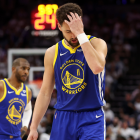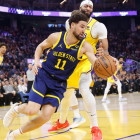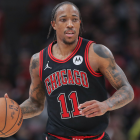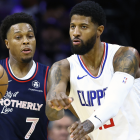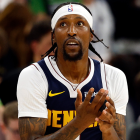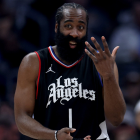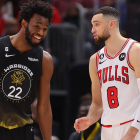TORONTO — Dwane Casey sat in the Toronto Raptors’ media room and spoke for 31 minutes on Monday. On his right hand was 2011 NBA championship ring, earned as an assistant coach for the Dallas Mavericks. He’d worn it the night before in Washington, hoping it would give the Raptors a boost as they tried to avoid a first-round sweep. It did not — the Wizards won 125-94, with Paul Pierce getting the last laugh for a second straight season.
On Casey’s right wrist was a green wristband he’d picked up at Seattle Seahawks training camp last summer. The wristband, which he’d worn all season long, had two words on it: “What’s next?” Given that Toronto’s season ended so embarrassingly, no one in attendance could quite answer that question.
“My job is what it is,” Casey said, well aware that there is speculation about his future with the franchise. “I can’t control that. That’s going to be out of my hands, out of my control. I’m very confident in the body of work that we’ve done here to take the program from where it’s been to where it is now.”
A season ago, Casey did his end-of-season chat with Raptors general manager Masai Ujiri at his side. Together they announced that he had signed a three-year deal worth a reported $11.25 million. Only two of those years, however, were guaranteed. In the meantime, Toronto followed up its feel-good 48-win campaign with a franchise-record 49, but fell so far after its 24-7 start that there are bound to be changes coming.
Casey, known as a defensive-minded coach when then-Raptors general manager Bryan Colangelo hired him in 2011, presided over the league’s 25th-best defensive team and fourth-best offensive team in 2014-2015, per Basketball-Reference. Even in November and December, he seemed uncomfortable with how Toronto was winning. The isolation-heavy offense built around Kyle Lowry, an All-Star starter this season; DeMar DeRozan, an All-Star the year before; and Lou Williams, the newly named Sixth Man of the Year, proved inadequate in the postseason.
“I thought a lot of our defensive woes was connected directly to our shot selection, our quick shots,” Casey said. “Make or miss, you’ve got to establish a style of play that will help get you back on defense, get your jerseys back where you’re 5-on-5 more so than in transition or coming back frustrated because you didn’t touch the ball.”
Casey took responsibility for not establishing the sort of offense he wanted, and said that the Raptors need one where his players will know they’ll be more involved on each possession. He said he trusts Ujiri to get the right talent for the style they want to play on defense, and he’s confident in his own knowledge of what it takes to build a winning team.
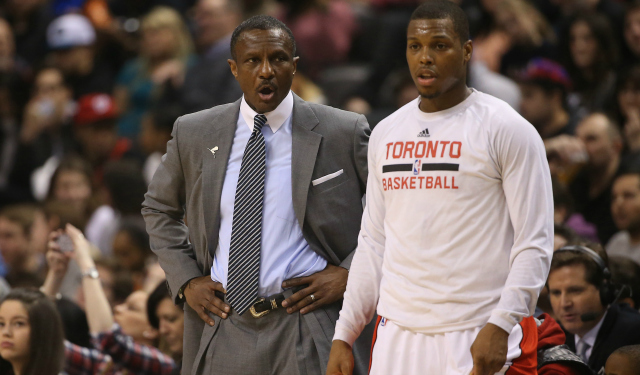
“I respect Casey as a man,” Lowry said. “He's a hell of a guy. At the end of the day, like I said, it's not my choice, not my decision. At the end of the day, yeah, if he's the coach, I'm a player. I've said that a couple of years now. At the end of the day, whoever the coach is — if he's the coach, then I'll be back playing for coach Casey.”
Big man Amir Johnson, a free-agent-to-be and the only Raptor other than DeRozan whose Toronto tenure predates Casey’s, offered a similarly lukewarm take: “I would play for him. If everybody’s here, coaching staff, everybody’s here, I’ll play for him.”
DeRozan said he knows Casey gets a lot of flak and credited him for pushing the team, and maintaining that the roster just needs one or two tweaks to take the next step. To reserve guard Greivis Vasquez, the coach wasn't to blame for the collapse. He said Casey was honest with everybody and, “at the end of the day, the players are the ones playing.” He did, however, have an issue with Toronto’s approach.
“Frankly, I felt like our offense was good, we got guys that can score,” Vasquez said. “But I felt like, in order to win games in the playoffs, you have to play unselfish basketball.”
Vasquez said the Raptors don’t need to panic, that they know they should have done better but are still on the right track. He added that they need some guys to step up, speak up and challenge the rest of the team.
“Basically, we need a Paul Pierce that’s going to talk that trash,” Vasquez said. “You need to have that spiciness. You need to be a little bit of an asshole like he is, saying the things he say and backing it up. This man say whatever he say and we went on the court and did it. That’s what we need. We need a guy who is going to talk the talk and walk the walk.”
In addition to Williams and Johnson, Toronto’s Tyler Hansbrough, Chuck Hayes, Landry Fields and Greg Stiemsma will be free agents in July. Ujiri has cap space to play with and difficult decisions to make. Casey said the strong start brought a false sense of security, and the players took practice as a punishment -- is that more the fault of the staff or the roster?
”I felt a sense of complacency among all of us,” Casey said. “I think the mood was guys felt like everything was going to be OK — we’re going to be all right; once we get to the playoffs, we’ll just flip the switch. No, you can’t. And I think this playoffs should be a lesson to all of us.”
The obvious question was whether or not Casey will get a chance to show he’s learned from it — “no one’s told me any different,” he said.









